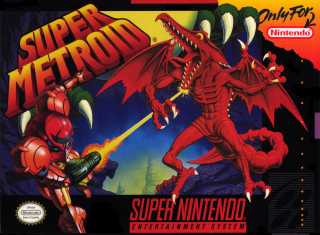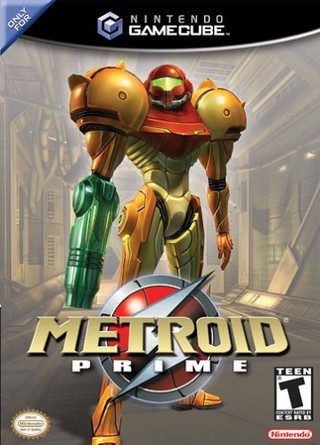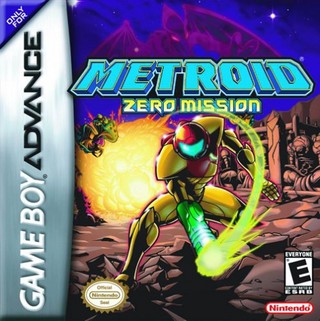Metroid and Me, Part 1: In the Beginning
By majormitch 12 Comments
Welcome to the first part of what will ultimately be a seven part blog series! I've had the idea for this series in my head for a long time, and I’m excited to finally get it out there. So what exactly is it? Titled "Metroid and Me," this blog is a lengthy, introspective look at why the Metroid franchise has connected with me so strongly on a personal level. It's long been among my favorite video game franchises, and I've found myself thinking about it a lot lately. Different games connect with different people in different ways, and I feel it would be an interesting and worthwhile exercise to thoroughly explore why Metroid has done that for me. What is it about Metroid specifically that clicks with me so much? What is it about my personality and preferences that draw me to this franchise? Why haven't other seemingly similar games grabbed me the same way? These are the kinds of questions I'm looking to answer here.
There will be seven parts to this series, including this one, and I will post one a week for seven weeks. Each part will focus on one substantial aspect of Metroid that I feel is important to my affection for the series. Topics such as atmosphere, world design, and isolation are among those on the docket, and my goal is that by the end I will have thoroughly and holistically covered everything that's critical to my connection with Metroid. Hopefully this structure accomplishes what I want it to, and proves to be an entertaining and engaging form of expression. And now that you have a rough idea of what this blog series is about, let’s get started! Today's topic is an introductory one: my personal history with Metroid.
| Remix Title: In the Beginning... | Original Song: Title (Metroid, 1986, NES) |
| Remixer(s): Mercury Adept | Original Composer(s): Hirokazu Tanaka |
In the Beginning
Where did it all begin? What was my first encounter with Metroid? Ironically enough, I don't think I can pinpoint the precise moment that I first played a Metroid game. If I had to guess, first contact came from briefly playing Metroid II: Return of Samus at a friend's house when I was very young. I barely remember anything about it; all I remember is loading up an existing save file and not knowing what to do or where to go, and I doubt I tried it for more than an hour. Feeling lost may be a natural reaction for people playing Metroid for the first time, especially if you're very young and diving into an existing save file. But the experience didn't leave a lasting impression either way.

Regardless of what my official first encounter with Metroid may have been, I do in fact know when I first experienced the series in earnest. I wasn't old enough to start actually following video games until the turn of the century (I was born in 1986 for reference). Until then, what games I played were determined almost entirely by what box art looked cool at the local rental store, or perhaps by what friends at school talked about. Super Metroid managed to elude both of these, and seeing as Metroid went into hibernation from 1994 to 2002, I was unlikely to get any further exposure to the series during that time. Once I was old enough to pay attention and follow games on my own, however, I became aware of Super Metroid and its legacy. Furthermore, the double whammy of Metroid Fusion and Metroid Prime were coming in 2002. Thus, I quickly went from barely knowing about Metroid's existence to curiously eyeing a trio of fresh Metroid games. It was time to dive in and find out what Metroid was for myself, so I found a copy of Super Metroid, and was off to the races.
I won't say it was love at first sight, because I'm sure there was a learning period to understanding what Super Metroid was. It was very different from the kinds of games I had played at that point in my life, and it required a particular attention to detail that I wasn't used to needing. But it didn't take long for me to "get it;" I was on board pretty quick. Exactly what I "got" is the exhaustive subject of future parts, so for now just know that I enjoyed every moment of my first true Metroid experience. It was also perhaps the perfect game to formally introduce me to the series, as Super Metroid is in many ways the best and purest representation of the series to date. After that initial playthrough, I immediately wanted to jump back in and find items I had missed, discover new paths, and try for a better time. I played through Super Metroid a few times in quick succession, exploring as much of this captivating game as I could.

I did want to move on, however, because two new Metroid games were coming in hot. As mentioned, I didn't get around to playing Super Metroid until Metroid Fusion and Metroid Prime were both almost out. Between those I started with Metroid Prime, and I was immediately blown away by it. The game sucked me in with its stunning audiovisual presentation, and I felt that the first person perspective and 3D world brought a new sense of wonder to proceedings. Things felt more intimate, more "in your face" this time around, and yet it never lost what made Super Metroid such a special thing in the first place. Despite all the hubbub about Metroid becoming a first person shooter, playing Metroid Prime made it clear that it was still very much a Metroid game above all else; adventuring and exploration remained the focus. In short, I absolutely loved Metroid Prime, and afterwards I moved on to Metroid Fusion. I enjoyed Fusion for sure, but I also didn’t feel it was as strong as either Super or Prime. I didn't feel its world was as intricate or as sprawling as those two, and the mediocre dialogue didn't do much for me either. Still, it remained a Metroid game at its core, with many of the series’ trademarks intact, and one I very much liked.
At this point I had been introduced to the franchise, and played three wonderful Metroid games in a very short time. And in doing so, I had quickly become enraptured in what it had to offer. Seeking as much Metroid as I could, I next decided to go back and play the two games I had missed: the original Metroid, and Metroid II: Return of Samus. While I technically had played a small amount of Metroid II many years prior, I didn’t remember any of it. So as far as I was concerned, these were both brand new Metroid experiences for me, despite both being over a decade old at that point. Their age showed too, and while I certainly enjoyed seeing the series’ first two installments for myself, they clearly weren’t as polished or refined as the games that followed. Super Metroid in particular simply seemed like a bigger, better version of the original, but those first two games were by no means bad, even that long after the fact. The core essence of Metroid was there from the start, amidst the rough edges, and was still good enough for me to enjoy exploring their expansive worlds. Ironically, Metroid: Zero Mission came out around this time as well, and I followed up my history lesson of the series by playing through this remake. I thought it did a wonderful job at giving the original a fresh, modern coating, and I found it to be yet another awesome Metroid game.

Metroid felt like it was on a roll at that point. I was in some kind of golden Metroid bubble, and there was yet another big new Metroid game right around the corner: Metroid Prime 2: Echoes. I immediately plunged into this sequel upon its release, and enjoyed it nearly as much as its predecessor. While I do think Metroid Prime remains the better game overall, Echoes had some interesting design elements that I found very endearing, and the core Metroid tenets remained present and strong. I know Echoes was not as widely loved as the original, which in some ways made sense; this felt like the Metroid game made for die-hard Metroid fans more than a wider audience (which was somewhat ironic given this was the one with multiplayer). But as a fan, I liked Echoes’ campaign a hell of a lot. Yet it’s also the turning point for the series in my mind, and it’s where my personal Metroid bubble “burst,” so to speak. Until then I had more great Metroid games to play than I knew what to do with. Following Echoes, however, I feel like they started trying to reach a wider audience more aggressively. While I’m all for trying new things, and don’t think any company is wrong to pursue a new strategy, that doesn’t change the fact that the subtle changes they made did not resonate as much with me personally. This led to a handful of games that, while not always bad, I didn’t exactly love.
This shift began two years after Echoes with Metroid Prime Hunters (I skipped Metroid Prime Pinball because it’s, well, a pinball game). While not a terrible game, it was pretty clear that Hunters was where the focus tipped more towards shooting, rather than adventuring. Whether it was meant as a technical experiment, or as an attempt to widen the series’ appeal, I will never know (I would guess some of both). Either way, too much of the Metroid fundamentals were lost in the transition, and what replaced them simply wasn’t as interesting. It felt more like an offshoot to me, and that feeling persisted into a much more high-profile game in Metroid Prime 3: Corruption. While I liked Corruption much better than Hunters (Retro Studios’ standard of quality certainly helped), it still felt like it was missing something, that je ne sais quoi that defined previous Metroid games. Travelling between multiple disjointed worlds didn’t have the same scale or sense of discovery, the puzzles, bosses, and collectibles weren’t as devious or memorable, and the poor dialogue and stilted NPCs took away from what life and atmosphere still existed in the worlds themselves. Don’t get me wrong; I enjoyed Corruption a fair amount, and do not consider it a bad game by any stretch. But it was clear to me that this was a different thing from previous games in the series, and one that didn’t resonate with me quite as strongly.

Finally, the only Metroid game to come out since Corruption was the infamous Metroid: Other M. I still think there is room in the world for a more action heavy Metroid game, but Other M was clearly not it, and missed the mark in numerous ways. The control and design weren’t there, the environments and enemies were not interesting or atmospheric enough, and the game’s narrative and tone were just a mess. Chalk it up to a failed experiment if you want, but either way Other M did nothing positive for me, and I’m totally content to ignore it in the grand scheme of things. That game came out six years ago, in 2010, and there’s been no news of a proper Metroid game since (only of the upcoming spin-off, Metroid Prime: Federation Force). That means it’s been over a decade since the last Metroid game I truly loved came out. I don’t bemoan that fact; whatever happens going forward doesn’t take away from the joy the series has already given me. I do wonder about the future of Metroid, but only time will answer that. In the meantime, I can always revisit the classics, which I’ve done numerous times in the past decade. Super Metroid and Metroid Prime are the main ones, as I believe they are easily the series’ pinnacles. They are the two games that best embody what the series is all about to me, and I’ve played both numerous times from start to finish. I’ve also replayed many other games in the series at least once, and I don’t feel like I’ve exhausted the well yet either. The good Metroid games are timeless in their design, and hold up exceedingly well today.
I had two goals with today's introductory part. First, I wanted to give a brief overview of what this blog series is, and what's happening with it going forward. Second, I wanted to cover my history with the Metroid franchise in more detail. The latter was today's main topic, and I think that context is important to cover before diving into the real meat of this series; it establishes a baseline for my perspective that I will build upon. Hopefully today’s entry has provided that, and was a worthwhile and enjoyable (if abridged) trip down memory lane. Keep an eye out for part two next week, where I will really begin diving into the heart of this blog series, beginning with one of Metroid’s biggest strengths: its sense of adventure!
